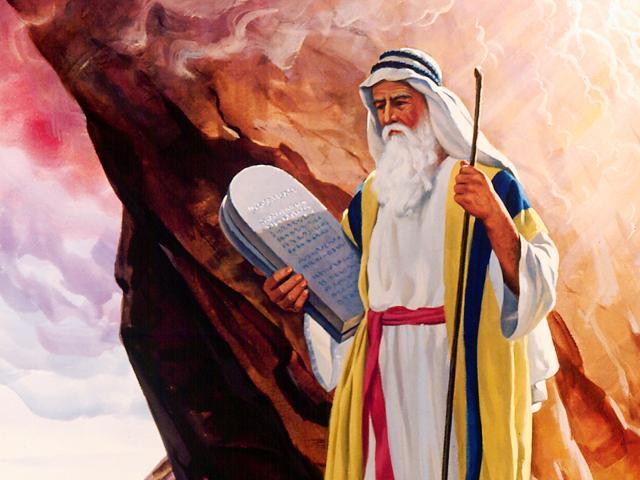 In 1992 Daniel Fuller authored The Unity of the Bible to show that Genesis to Revelation tell one overarching narrative. That’s often hard to see when we open that big 66 book Book. It can seem rather disjointed, even contradictory. Take, for example, the apparent disconnect between promises to Abraham to believe and commandments to Moses to obey. Well, which is it—faith or obedience? Can we just pick and choose the passages we prefer? Or, is there an overarching narrative, a unity which we can trust?
In 1992 Daniel Fuller authored The Unity of the Bible to show that Genesis to Revelation tell one overarching narrative. That’s often hard to see when we open that big 66 book Book. It can seem rather disjointed, even contradictory. Take, for example, the apparent disconnect between promises to Abraham to believe and commandments to Moses to obey. Well, which is it—faith or obedience? Can we just pick and choose the passages we prefer? Or, is there an overarching narrative, a unity which we can trust?
Judaizers (professed Christian Jews who preached justification with God comes through faith in Christ plus Jewish circumcision and law-keeping) were troubling the new Galatia churches (1:6,7). Paul passionately pushed back. Look at Abraham, father of the Jewish nation, he said. He “believed God, and it was counted to him as righteousness . . . Know then that it is those of faith who are the sons of Abraham” (3:6,7). And ” . . . we (Jews, descendants of Abraham) know that a person is not justified by works of the law but through faith in Jesus Christ, so we also have believed in Christ Jesus, in order to be justified by faith in Christ and not by works of the law, because by works of the law no one will be justified” (2:16). Justification comes by faith alone in Christ alone, as God’s covenant with Abraham (before circumcision and the law) reveals.
Brothers, let me take an example from everyday life. Just as no one can set aside or add to a human covenant that has been duly established, so it is in this case (2:15).
Paul illustrates from the legal system of his day. Once a man-made covenant was ratified it was unmovable and unchangeable, written (we might say) in stone. So, says Paul, with God’s covenant with Abraham. Righteous-standing with God comes by faith in God’s promises.
Now the promises were made to Abraham and to his offspring; it does not say, 
“And to offsprings,” as of many; but it says, “And to your offspring,” that is, to one person,
who is Christ. My point is this: the law, which came four hundred thirty years later,
does not annul a covenant previously ratified by God, so as to nullify the promise.
For if the inheritance comes from the law, it no longer comes from the promise;
but God granted it to Abraham through the promise.(2:16-18).
Even though God promised Abraham offspring as uncountable as the stars (Genesis 15:5,6), Paul pointedly uses “offspring” “to one person, who is Christ.” (Check Matthew’s non-exciting genealogy that starts with Abraham and culminates in Christ–Matthew 1:2-16.) Paul claims that when God made promises to Abraham, he made them also to his offspring, Christ.
Remember the Judaizers are trying to dump law-keeping into the justification mix. So Paul makes his point about Abraham plain. “My point is this: the law, which came four hundred thirty years later (through Moses) , does not annul a covenant previously ratified by God (see Genesis 15), so as to nullify the promise.” Righteousness/justification/right-standing with God– comes through God’s promise to Abraham culminating in Christ.
But why the law? If the Scripture narrative is a unity and runs from promised justification through faith to Abraham to promised justification through faith in Christ, law seems to intrude and shatter the unity. No, Paul insists. The four-centuries-later law doesn’t annul God’s covenant with Abraham.
What, then, was the purpose of the law? It was added because of transgressions until the Seed to whom the promise referred had come. The law was put into effect through angels by a mediator. A mediator, however, does not represent just one party; but God is one. Is the law, therefore, opposed to the promises of God? Absolutely not! For if a law had been given that could impart life, then righteousness would certainly have come by the law. But the Scripture declares that the whole world is a prisoner of sin, so that what was promised, being given through faith in Jesus Christ, might be given to those who believe. Before this faith came, we were held prisoners by the law, locked up until faith should be revealed. So the law was put in charge to lead us to Christ that we might be justified by faith (3:19-24).
Through Moses the law was added, the Ten Commandments forming 
the core (Exodus 20:1-17). The Lord gave this preamble to Moses
on the mountain: “You yourselves have seen what I did to the Egyptians,
and how I bore you on eagles’ wing and brought you to myself. Now therefore, if you will indeed obey my voice and keep my covenant you shall be my treasured possession among all peoples for all the earth is mine; and you shall be to me a kingdom of priests and a holy nation” (Exodus 19:4-6).
Though the Lord had saved them from slavery by his grace, if the Hebrews were to live as his treasured possession they had to obey the law of the covenant. Worse than telling a seven year-old child who’s been coddled and cuddled he has to start doing chores to be part of the family. Abraham: promises by faith. Moses: promises by obedience.
In this paragraph Paul explains critical distinctions about the nature of God’s law. First, it was temporary. “[The law] was added . . . until the Seed to whom the promise referred had come.” Second, “[The law] was added because of transgressions.” By that I take Paul to mean, “The law was added so I might know my transgressions.” This is what he wrote later in Roman 7:7— ” . . . if it had not been for the law, I would not have known sin. For I would not have known what it is to covet if the law had not said, ‘You shall not covet’.”
Third, the law was “put in place through angels by an intermediary.” The role of angels in giving the law appears to exalt the law. But Paul means the opposite. In some way God used angels to mediate the law to Moses who then announced it to the people. But when God made his promises to Abraham, he spoke directly to Abraham. Thus the promises hold a “holier” nature than the law.
Does the law, then, interrupt God’s narrative unity. Is Moses an intruder? Not at all. God’s concern here is not to demand obedience to law but to “impart [a righteous, justified] life.” Law cannot do that. A lawfully-given speeding ticket may lighten my foot on the accelerator for a while, but soon I’m doing 60 mph in a 50 zone again. And even when keeping the limit, my insides are frustrated by the ticket and crying, “Speed it up!”
Paul gives us two final purposes for the law. Fourth, law “imprisoned everything under sin.” “Imprisoned” suggests sin is a power we can’t overcome. Prison bars restrain. Lock us in. No escape. God gives Ten Commandments and, in almost no time at all, we realize we not only don’t keep them, we can’t.
The fifth purpose for the law flows from the helplessness of the fourth. The law is a guardian. The NIV translation above translates the Greek noun, paidagogos, as a verb to describe its function. A paidagogos was a slave who conducted a freeborn boy to and from school. The ESV translates, ” . . . the law was our guardian until Christ came, in order that we might be justified by faith.” The law kept us reasonably on God’s right path. It identified danger and sin. It promised blessings and reward. But it left us fallen short. The road to right-standing with God wound up to a high and rugged holy mountain. Our very nature rebelled against it (to say nothing of the devil stalking us every step of the way).
But note the narrative unity here. God’s promises righteous by faith to Abraham and ultimately to Christ. He gave us law so we could see our wretched transgressions against his holy and good will and to lead us to the only One who could put us in right-standing with the holy God—Jesus Messiah.

So, you see, not only is the Bible one overarching narrative, so is the Gospel of our salvation. It began when God gave his promises to Abraham. Continued when he gave the law through Moses. And it climaxed in the coming of Christ. “Christ redeemed us from the curse of the law . . . ” (3:13). “And, if you are Christ’s then you are Abraham’s offspring, heirs according to promise” (3:29).
Recent Comments